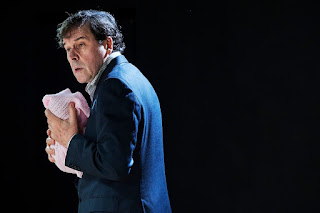Cyprus Avenue
photo by Roa Kavanagh
The Public Theater has brought across the Atlantic Cyprus Avenue from The Abbey Theatre, Dublin, and The Royal Court Theatre, London. David Ireland has written a 100-minute piece that starts as a black comedy and morphs into serious tragedy.
In late middle age, poor Eric, a Protestant in Belfast, has been having trouble sleeping. The insomnia triggers a psychotic episode, and we watch as his delusion develops. He has a new granddaughter, Mary Mae, who looks like Gerry Adams, the Catholic political leader (and, some would say, terrorist sympathizer). No! He decides Mary Mae is Gerry Adams! Worse, he’s always considered himself British, but now he worries that he himself might be - gasp! - Irish.
From then on, it’s an unswerving downward trajectory. Eric befriends Slim, a Protestant paramilitarist out on his first job, which is to kill Eric because he’s been raving on the park. Eric talks him out of this, and, by way of compensation, invites him to kill Mary Mae.
The play starts with a scene in a psychiatric hospital. “Why are you a nigger?” he asks his black therapist, Bridget, with no intent to be offensive. Most of the rest is flashback, although Mr. Ireland returns to the hospital a few times, including in the last scene, when Eric explains “Without prejudice we’re nothing. If we don’t discriminate, we don’t survive.”
When he’s not there or in the park, Eric is at home with his wife, his daughter and Mary Mae, and it’s there that most of the delusion is revealed. It starts innocently as obsession. The Catholics have all the good songs, he reflects on When Irish Eyes are Smiling; “A Protestant’s eyes never smile unless it’s absolutely necessary.” Bill O’Reilly, Barak Obama, The Pope - all of them Catholic. Then it all deteriorates into a meltdown.
Mr. Ireland is a skillful playwright, cleansing our emotions with comedy before exposing them to pity and terror. He enjoys Irish phrasing - “I’m ready for murderin’ this man” Eric’s wife says. And he suspends a sense of mystery over Eric by having no one call him by his name until a half-hour into the play. Indeed, I think that no one calls his wife by her name as listed in the program at all.
The problem is that nothing precipitates the psychosis. All we know of is the insomnia that Eric complains of early in the play. The plot needs more of a trigger.
All the work on stage is terrific, polished to the glossy patina we expect from that side of theAtlantic. The leading man, Stephen Rea, has impeccable technique. His speech ranges from subtlety to fireworks; his physical life is emotionally grounded, never false. But he’s been directed to yell too much. A scene can only afford to reach a mad pitch for a few moments, and Mr. Rea remains there too long. There’s more to psychosis than shouting.
The rest of the cast is superb as well - Ronke Adekoluejo as the patient, professional Bridget, Andrea Irvine as Eric’s wife who orders him out, Amy Molloy as his distraught daughter. As Slim, Chris Corrigan plays a complex character, a common hitman who quotes Plato and refers to Catholics as “latter-day Machiavell’s”. And they all sound delicious in their Irish dialect.
Director Vicky Featherstone keeps everything moving along quickly. At first, it’s the pace of comedy, and then we experience the same rate of words-per-minute as the out-of-control thrust of fate. It’s unfortunate that she depends on volume to make the point about Eric’s insanity, but she modulates everything well otherwise. He sits on the park bench for a long time before he gets up and starts darting around, and his scenes with his daughter are subtle and well structured.
The stage area cuts the audience in two. The simple set might be reconsidered. It’s violent white and limits the emotional tones on stage.
But Cyprus Avenue is a great import. It’s not hard to extend its points to certain personalities in this country - God knows! Mr. Ireland is writing new plays for The Abbey and The Royal Court. Let’s hope the productions make their way across the pond as well.
review
Steve Capra
June 2018



